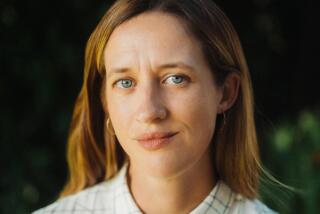Asghar Farhadi of the Oscar-winning ‘A Separation’ looks to ‘The Past’
Asghar Farhadi’s “A Separation” not only won the foreign-language Oscar, it was also the rare foreign-language film to break through to a nomination in a more mainstream category, earning a nod for original screenplay. After also picking up multiple other festival and critics’ prizes, the film went on to earn more than $7 million at the U.S. box office.
With “The Past,” Farhadi has shown that the success of “A Separation” was no fluke, as he has crafted another rich, insightful look at the emotional and psychological bonds of family. Ahmad (Ali Mosaffa) returns to Paris after a four-year separation from his wife, Marie (Bérénice Bejo), to finalize their divorce so she can marry another man, Samir (Tahar Rahim). To move forward, all of them must deal with the fallout of past relationships, including Samir’s coma-stricken ex-wife and Marie’s teenage daughter.
Having premiered at the Cannes Film Festival, where Bejo won the best actress prize, “The Past” is Iran’s submission for this year’s foreign-language Oscar. Farhadi sat with The Envelope to talk about the film, stories within stories and leaving the past behind.
I’ve noticed how when I have tried to describe “The Past” to people, I struggle to land exactly on what the story is — it’s a family drama, a divorce story, there’s even an element of a mystery.
The film doesn’t really have a main story. There are stories that are inside each other a bit like a Russian doll.... I think this is something that comes from my other films. There is a situation, and then we see a series of characters that are placed around the situation, and the ways in which they relate to them produces a number of different stories. Each of these characters has their own story, but each of them, within their various stories, find themselves in the same situations.
Where did the story start for you?
I begin with a man coming from Iran to France, and then gradually in the course of writing I discovered the other characters. But for me, the core story is the story of the woman in the coma. But it’s possible for a spectator to see it all differently, in that for them a different narrative thread becomes the central one. It doesn’t matter at all. It’s possible that for a certain viewer the story of the young boy becomes the central story and that they want to know everything about him.
As the action unfolds, Ahmad accuses Marie of inviting him back to France knowing it would cause all the events of the film to occur, that the situation would explode.
I really don’t know, but that’s a guess Ahmad is making about Marie. My guess is that Marie has requested Ahmad come to Paris, and unconsciously all this starts to unfurl. We always think that people plan and think before performing an action or doing something, but the truth is actually that often they do things and then they think about it. I think the character of Marie first told Ahmad to come and then started to think about it. I think it makes the characters more real.
TIMELINE: The Academy Awards through the years
When you are writing, do the characters speak to you? Do you know what all their actions will be when you start to write?
They are mysteries to me as well. When I read what is written of my films, they are spoken about as if characters are puppets on a string I am moving around. But the truth is that that’s not how it works. The characters dictate what they should do. Once you start to think about them, they come to life. Sometimes I want a character to do something, but then I feel the character wouldn’t accept it.
Even though it isn’t much spoken of, it seems all three of your main characters come from someplace else. Why did you make that decision?
When I brought these different people together in one film, I wasn’t trying to create a microcosm of the world. The reason why none of these characters are from France, besides the woman in the coma, is because with the theme of the film being “the past,” I decided that each of them has up and left behind the place they were from and come to another place, they have necessarily cut off their past. When we emigrate from one place to another country, we are sacrificing our past and our future. And all these characters have sacrificed their pasts. But our past remains with us always, like a dream. We can choose not to look at it, but it exists.
More to Read
Only good movies
Get the Indie Focus newsletter, Mark Olsen's weekly guide to the world of cinema.
You may occasionally receive promotional content from the Los Angeles Times.









